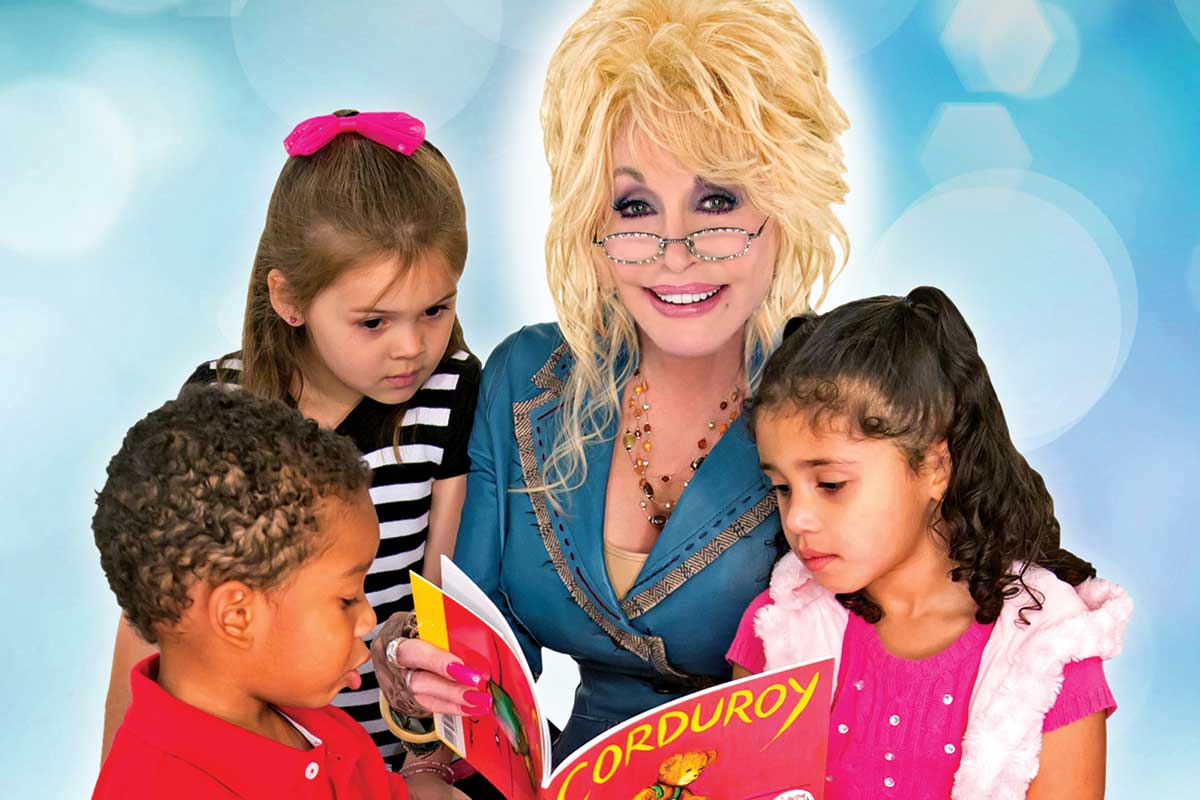John Wantland opens a slim volume at a sturdy wooden table at the Round Top Family Library, his family gathered around him. “There’s a log on the bottom of the lake, there’s a log on the bottom of the lake, there’s a log? There’s a log! There’s a log log log, there’s a log on the bottom of the lake,” he reads aloud, displaying the pages’ nature-inflected palette of green, gold and brown.
“And that would be the first refrain. It’s a sing-songy call-and-response story, and it builds on itself,” says Wantland, a ranch manager who lives near Round Top in east Central Texas. There’s a Hole in the Log on the Bottom of the Lake, written and illustrated by Loren Long, introduces elements with each successive refrain, including a frog, fly and gnat. “So by the end of it, you’re just out of breath and laughing,” Wantland says.
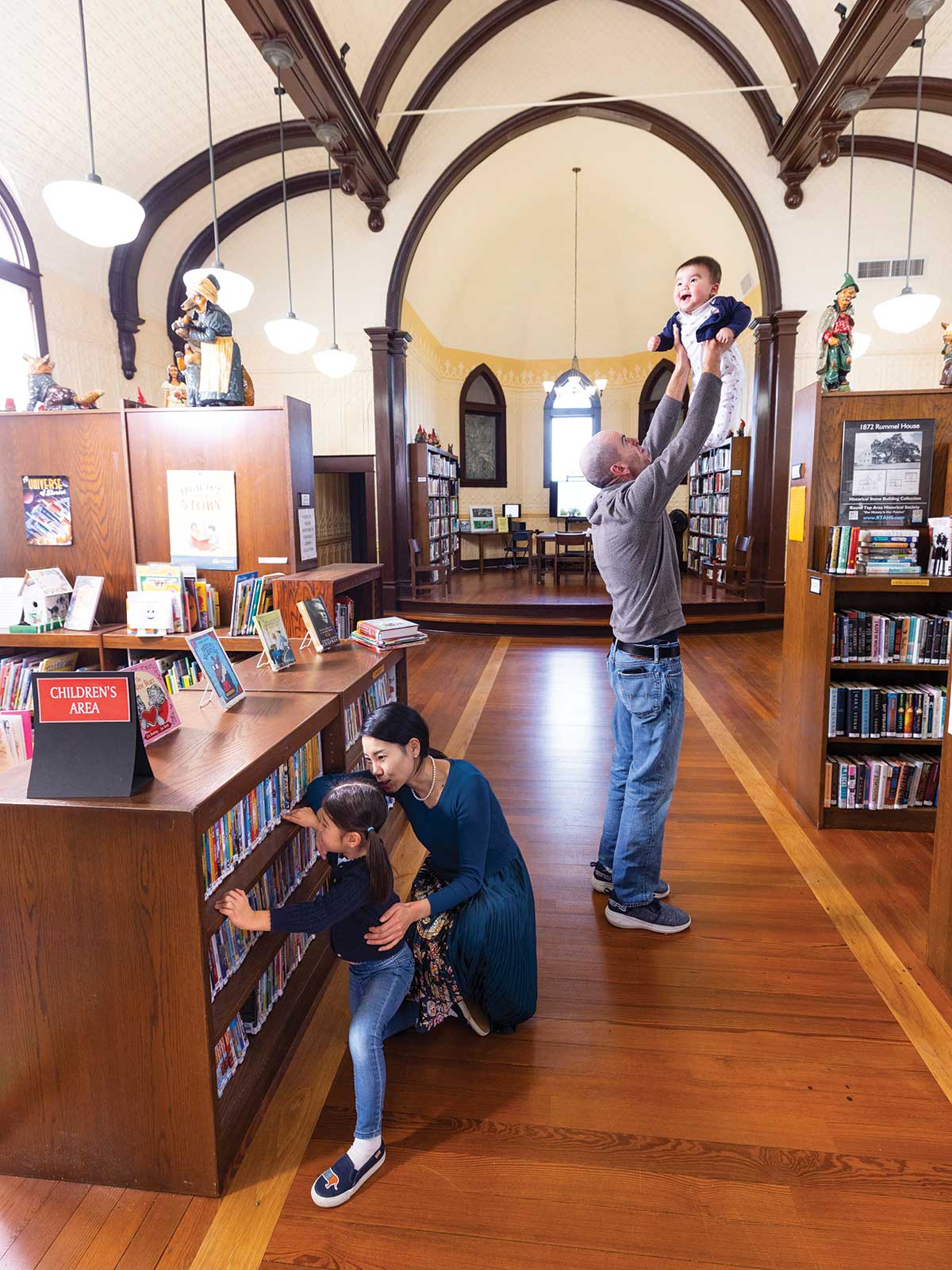
Jihyun and John Wantland with daughter Lilianna and son Noah visit the Round Top Family Library, which partners with the Dolly Parton Imagination Library program.
Erich Schlegel
The tale is a favorite of Lilianna’s, John and Jihyun Wantland’s 4-year-old daughter, who received it as one of more than 1.9 million participants in Dolly Parton’s Imagination Library. Every child enrolled in the program receives a free, personalized, age-appropriate book in the mail each month.
Parton started the program in 1995 to supply books to children in her Tennessee hometown, and over 27 years it has grown exponentially with the help of 3,745 community partners in five countries.
When Lilianna was born, the family bought and was given many books, John says. But as their home library grew familiar, Lilianna’s interest in spending time together reading began to wane.
All that’s changed thanks to the Imagination Library.
“It’s certainly a special treat for her to get a book once a month,” Jihyun says. “We have 100 books for her, but she was tired of some.”
The fresh reads spark excitement for Lilianna and her younger brother, Noah. “Whenever these books come in, she’s like mailbox to the chair, and let’s read it now,” says John, a member of Fayette Electric Cooperative.
The Wantlands and some 17,000 other Texas children take part in that same magical trip to the mailbox each month thanks to the more than 1.7 million Imagination Library books that have been delivered in the state over the years. The whole goal is to get kids reading early so they’re more prepared for school and better equipped for a lifetime of success.
“Over the years, we learned a lot about what works, but the one thing I knew for sure is that to have even a remote chance for success, you have to know how to read and write,” Parton says. “And the best way to learn is to love books and love reading.”
An author herself, Parton founded the program as a tribute to her father.
“My daddy could not read or write, so I grew up with seeing how limiting it can be,” she says. “I often say he was the smartest man I have ever known, but I always wonder what else he could have done if he knew how to read.”
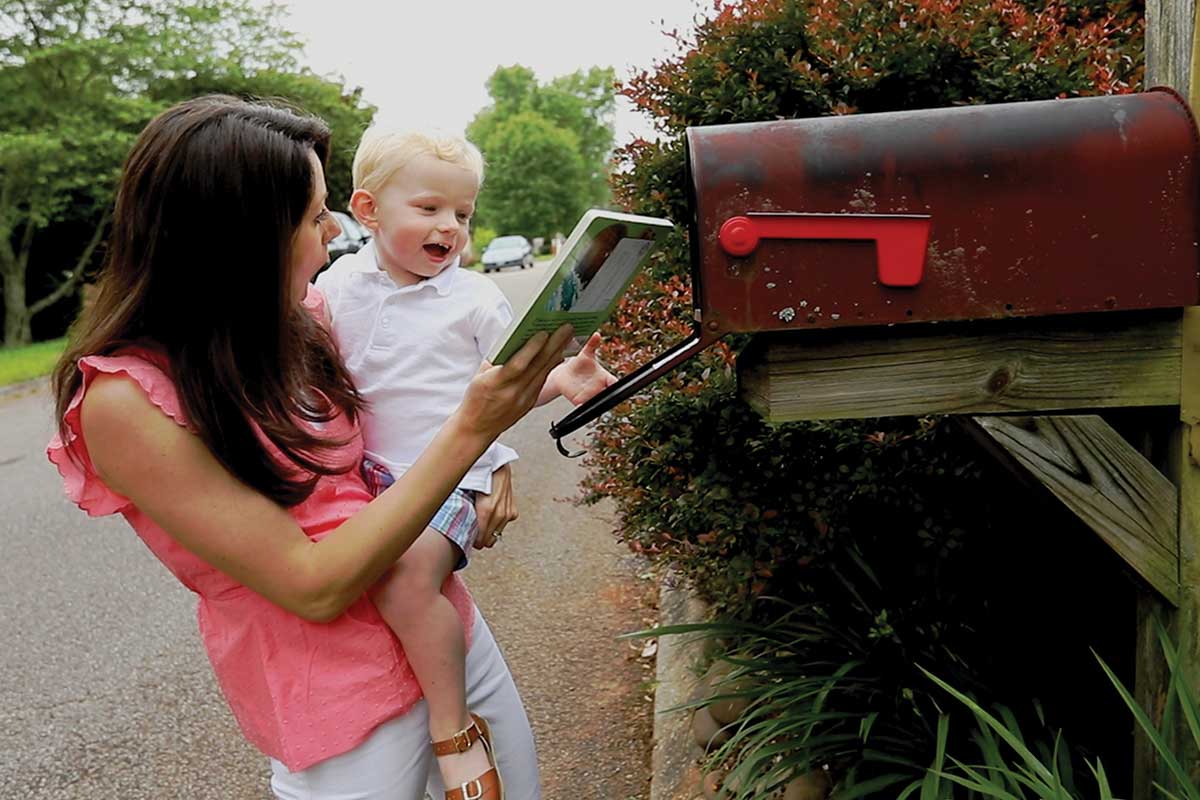
Enrolled children receive a new book in the mail every month.
Courtesy the Dollywood Foundation
Community investment is at the core of the Imagination Library, which partners with nonprofits—Lions Clubs, library foundations, electric cooperatives and other organizations—to fund and administer the program at the local level. Parton’s Dollywood Foundation handles the rest, tapping a committee of early childhood experts to select books focused on values including kindness, respect, acceptance and inclusion.
Children can receive the free reads from birth until age 5, when they head off to school. The selections change as readers age to expand on their abilities; two titles per year are English-Spanish bilingual, and every book includes reading tips that extend the engagement and interaction between child and caregiver.
The Imagination Library has found that participants are nearly twice as likely to read every day, more than 85% read at least three times a week and participants outperform their peers on assessments when they get to school. Reading aloud with an adult adds to those benefits, helping children build empathy, expand their vocabulary and recognize emotions.
Jihyun, who is from South Korea and not a native English speaker, has found that she and Lilianna learn from each other when they read together. “She will correct my pronunciation,” Jihyun says, smiling.
Despite all the good that books can provide, some 60% of U.S. children living in poverty don’t have a single children’s book in their homes. The Imagination Library is working to change that, especially among rural children who often have less access to public libraries.
“We know that receiving monthly books has a positive and significant impact on family literacy habits, kindergarten readiness and grade-level reading by third grade,” said Nora Briggs, executive director of the Dollywood Foundation. “DPIL puts country kids on more equal footing with their big-city peers.”
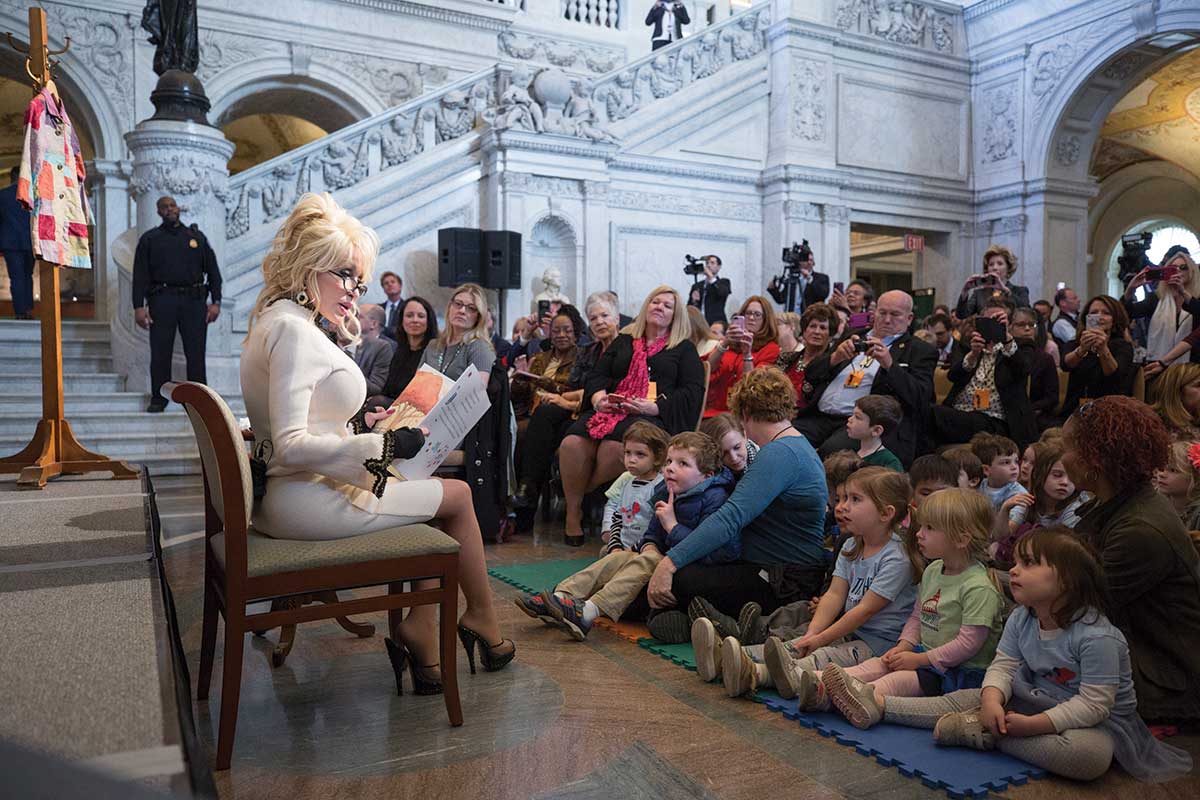
Dolly reads Coat of Many Colors, her book based on the song she wrote and the Imagination Library’s 100 millionth donation, during a 2018 ceremony at the Library of Congress.
Courtesy the Dollywood Foundation
Parton reads aloud stories on the Imagination Library’s YouTube channel. Those videos spurred Emily Shisler to enroll her daughters, Eleanor, 4, and Victoria, 2, in the program. “I watched them with my daughters when they would get up from their naps during the worst of the pandemic,” says the educational consultant from Houston and Fayette EC member. “And it was a little source of joy.”
The Shisler and Wantland families participate in the Imagination Library through its partnership with the Round Top Family Library, which has registered dozens of children in a five-ZIP code swath of Fayette and Washington counties since April 2020.
Julie Wantland, a member of the RTFL board and grandmother to Lilianna and Noah, implemented and coordinates the program at the community library. Despite the disruption caused by the pandemic, including a monthslong closure of the Round Top library, its collaboration with the Imagination Library meant it could continue to bring books to children, she says. “It really was one of the few things not terribly affected.”
Not all DPIL programs are supported by a physical library; all that’s required is investment from a local nonprofit. “It’s actually pretty easy to fundraise for because it’s such a wonderful program,” says Julie, also a member of Fayette EC. Neighboring organizations have pitched in to help cover the program’s costs, a portion of which each Imagination Library affiliate bears. The Round Top Lions Club contributed a year’s worth of funding last summer.
Several electric cooperatives across the U.S. have also found ways to fund local programs and bring free books to their youngest members. That’s what Maegan Caffey did for the folks in Comanche Electric Cooperative Association’s service area, which reaches parts of seven counties southwest of Fort Worth.
Caffey’s 4-year-old son, Oliver, is obsessed with books, she says, but she was disappointed to find that they didn’t have a local Imagination Library affiliate to feed his appetite. So the resident of the town of Comanche, between Waco and Abilene, made it her mission to start her own. When Caffey realized the goals of the DPIL align with that of the co-op, where she works as a communications and public relations specialist, she knew she had to act.
“This was a good way to show that we are not just the normal electric provider,” she says.
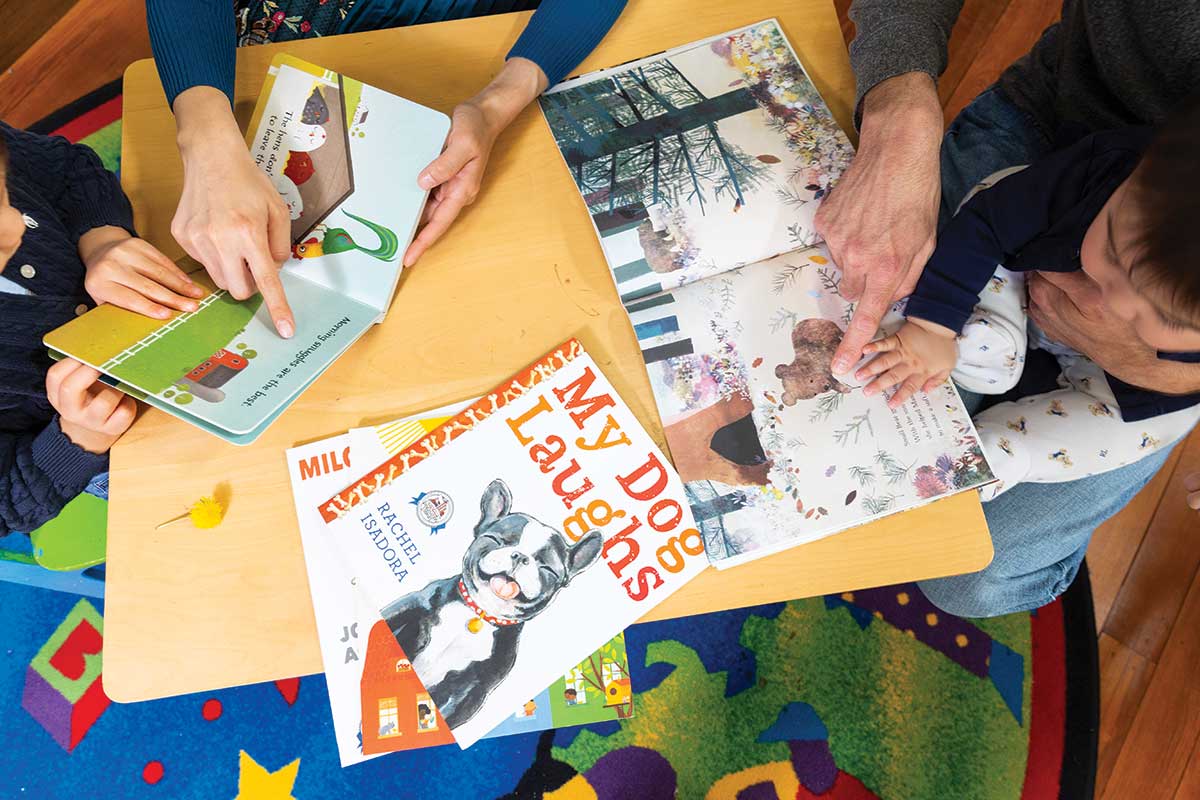
Dozens of Texas counties have affiliates that partner with the Imagination Library.
Erich Schlegel
Caffey says it was an easy sell for the co-op’s general manager and the board that oversees its community giving program. They immediately recognized the value for the co-op’s some 10,000 members and the greater community.
“They loved it,” she says. “A lot of the board members either have kids or grandkids, and so the idea of being able to bring that to families who may not have that opportunity was just a no-brainer for us. We wanted everyone to get that opportunity.”
The co-op funds its books with donations from members and partnered with the public library in nearby Eastland to bring the program to fruition in January. Eastland librarian Kathy Druesedow, a CECA member, is thrilled.
“The sad truth is that many children are unable to go to a library until they have access to their school library,” she says. “Dolly Parton and CECA are putting books straight into the hands of children who would otherwise not have the opportunity to touch or read a book until they attend school.”
Beyond preparing students for school, some parents have found that the books provide shared experiences that children can hopefully build on when they start kindergarten.
“I think there’s something really cool about the girls reading the same books that kids from all over the place are reading,” Shisler says. “It’s kind of this connected web: Here are all these kids from these different rural and other communities that are all having read The Little Engine That Could. And I think that’s a really special thing to be a part of.”
But for every individual young reader, there’s a much greater benefit found between pages. “I think they can learn so much from books,” Shisler says. “A world that’s a little different from theirs—different people, different cultures, different places. Books open a world of possibility.”
